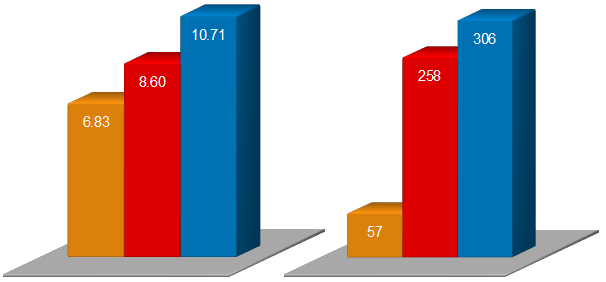If you weren’t aware, let me inform you that there was a general election in the UK yesterday. I kid ye not. After weeks of tedious bickering, debates which didn’t include a single punch, one hurled egg, insulting of bigoted pensioners and kissing of babies, it all culminated in a result which wasn’t really a proper result. Yes, we now have a hung parliament. What’s a hung parliament? Let me explain… no, actually, just read this. Or if this is already too boring, here’s some funny pictures of cute animals.
Okay, so the Conservative Party, also known as the Tories, gained the most votes and (more importantly) the most seats of elected Members of Parliament (306, which will most likely rise to 307 once the delayed election in Thirsk & Malton goes ahead). However, because there are 650 seats in the House of Commons, Dashing Dave Cameron and his cronies were 20 (soon to be 19) seats shy of a majority… hence the hung parliament situation. A government likes to think it can vote on a bill and win, which is a bit tricky when the combined force of the other major parties and minnow contingents outnumber you.
Here in Surrey Heath we sit among the Tory heartland. Our local MP, Michael Gove, was re-elected without breaking into a sweat and increased his share of the votes from 51.5% to 57.6% – not bad for someone who didn’t even turn up to a local debate (because he was bag-carrying for Mr Cameron that evening). And not bad for someone who trousered £7,000 of tax payers’ money to furnish his Kensington home, even if he did pay it back after the finger of suspicion pointed in his direction. To be honest, here in the sprawling metropolis of Camberley I didn’t see much (or any) campaigning… just a few signs. I presume the Tories didn’t think they needed to bother, assuming themselves to be a shoo-in on election night. As for the rest, they probably thought it wasn’t even worth the effort of trying to win. And looking at the results, it wasn’t.
Let’s spare a thought or two for Nick Clegg, leader of the Liberal Democrats. Nick’s ratings soared during the live television debates, and it seemed that after years of distant third places and a risk of being beaten by the Loonies that the Lib Dems may have been getting closer to the big two. Even the embarrassment of claiming £2.49 for cake tin wasn’t going to dent Nick’s confidence. But then we discovered why for so many years the Lib Dems have been advocates of proportional representation. The basic premise of proportional representation is that the elected government seats should closely correlate with the number of votes received. So why are the Lib Dems so keen on this? It’s best illustrated with two graphs based on the 2010 results:

On the left, we see the number of votes received in millions (Liberal Democrat = yellow, Labour = red, Conservative = blue). On the right we seat the number of seats in the House of Commons taken up by the three parties. While Labour and Conservative have a fairly consistent ratio between votes and seats, the Lib Dems don’t. Some basic maths tells us that for every seat won, the Conservatives received just under 35,000 votes… for Labour it was around 33,300 votes. But for the Lib Dems it was a ratio of just under 120,000 votes per seat. Why the big difference?
This has nothing to do with the Lib Dems winning seats in the most populous constituencies… quite the opposite actually. It was all about coming second in too many places. And what do you get for coming second in a contest for one MP seat? Nothing. Look at Surrey Heath… the Lib Dems were a clear second with 14,037 votes to Labour’s 5,552. Then look at Guildford where the Lib Dems netted 19,000 more votes than Labour. It’s a similar story almost everywhere the Conservatives won a seat… the Lib Dems came second with no reward.
Proportional representation would help the Lib Dems gain a greater standing in our democracy, but wouldn’t it also make a hung parliament more likely?

>Proportional representation would help the Lib Dems gain a greater
>standing in our democracy, but wouldn’t it also
>make a hung parliament more likely?
I think you are right about the likely practical effect of introducing proportional representation voting. However using the term “hung parliament” for the situation where no one party has an overall majority makes it sound like a bad thing.
In Ireland we have had proportional representation since the foundation of the state and generally people are pleased with the result. Indeed we have had many coalition governments, but many people feel that this has been a good thing because when a single party had an overall majority the leaders of that party felt comfortable to ignore the wishes of the people because they were safe from any form of oversight for the next few years. There have been many examples of where their was public outcry over something that happened and the majority party in government was inclined to “tough it out”, but the junior party insisted that some action was taken (e.g. the unpopular policy was reversed or the misbehaving politician resigned)
In the general election before last it looked like Fiannna Fáil were heading towards an overall majority. Then the Progressive Democrats who had been involved with a coalition government with then launched a campaign slogan that was something like “would you trust these guys to govern alone” alongside pictures of Fianna Fáil politicians who had been forced to resign due to corruption.